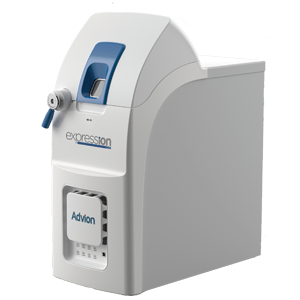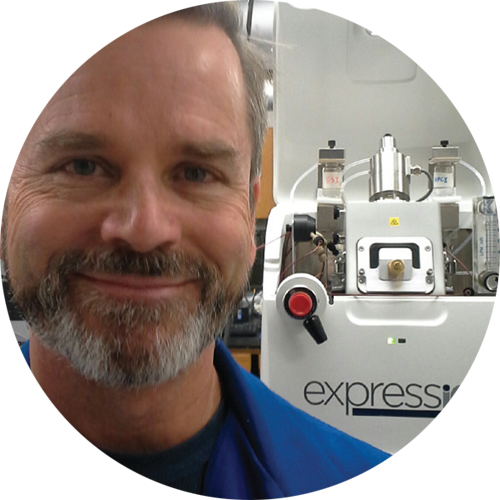Quant Express, an addition to Advion’s user-friendly Mass Express 4.0 software suite, features quantitation to create a fully integrated software system for expression CMS users.
Creighton University, Department of Chemistry
Q: WHAT IS THE FOCUS OF YOUR LAB’S RESEARCH?
A: The synthesis of modified histidines for solid-phase peptide synthesis and new routes to exocyclic allenes.
Q: WHAT WAS YOUR PREVIOUS WORK FLOW OR CHALLENGE?
A: Some Nim-tritylated histidine analogues and exocyclic allenes provided weak or no molecular ions using other mass spectrometry methods.
Q: WHY DID YOU INCORPORATE THE EXPRESSION® CMS INTO YOUR LABORATORY?
A: It’s easy, walk-up use with straight-forward swapping of ESI and APCI sources make it a reliable, productive tool for determining synthetic success.
Q: HOW DID THE EXPRESSION® CMS HELP RESOLVE YOUR CHALLENGES?
A: ESI and APCI resolved extensive fragmentation observed with some analytes.
Q: TO WHOM WOULD YOU RECOMMEND THE EXPRESSION® CMS?
A: Organic synthesis labs and undergraduate programs needing a simple diagnostic tool for reaction outcomes.
Q: WHAT IMPRESSES YOU THE MOST ABOUT THE EXPRESSION® CMS?
A: Students find it straight-forward to use and its sources are easy to clean.
Application of Mass Spectrometry in Small Molecule Medicinal Chemistry in an Academic Lab
The Montclair University team utilizes the Advion CMS in their undergraduate lab. Essential in the research-focused curriculum, the team was able to purchase the cost effective, small-footprint system to grow their lab capabilities. They later added an APCI module for their growing needs.
Albert-Ludwigs-University, Freiburg, Germany
Q: WHAT IS THE FOCUS OF YOUR LAB’S RESEARCH?
A: We investigate ionic systems to the fullest extent, both experimentally and theoretically. In doing so, we want to understand and exploit the fundamental principles that determine the behaviour of such systems.
Q: WHAT WAS YOUR PREVIOUS WORK FLOW OR CHALLENGES?
A: For sample analysis we use NMR, vibrational Spectroscopy and X-Ray Diffraction along with electrochemical measurements in our laboratory. However, for mass spectra the samples had to be given to the MS service of the chemistry department. This led to noticeable waiting times, so no reaction monitoring was possible. Also, some of the compounds usually lead to large memory effects and are therefore rather ‘unpopular’ at the MS service. Furthermore, a large part of the compounds we synthesize are air sensitive and could not be measured at all.
Q: WHY DID YOU INCORPORATE THE EXPRESSION CMS INTO YOUR LABORATORY?
A: With the expression CMS in our laboratory we can now use mass spectrometry as a standard analysis tool for reaction monitoring. PhD Students can measure their own samples directly after synthesis. They can even change the ion source on their own according to the nature of their samples. Samples with large memory effect are no longer problematic, as the inlet capillary can easily be cleaned. A major advantage is that we can now analyse highly air-sensitive compounds without difficulty and outside a glove box.
Q: WHO WOULD YOU RECOMMEND TO PURCHASE THE EXPRESSION CMS?
A: We would recommend the expression CMS to anyone who wants to implement MS as a fast and easy to operate standard method within their own lab.
University of Ljubljana, Slovenia
Q: WHAT IS THE FOCUS OF YOUR LAB’S RESEARCH?
A: In our Department of Medicinal Chemistry we have focus on the synthesis of novel molecules with biological activity. We synthesize molecules of natural origin, peptides and heterocyclic compounds. As integral part of the department’s work we also do drug analysis.
Q: WHAT WAS YOUR PREVIOUS WORK FLOW OR CHALLENGES?
A: The modern Faculty of Pharmacy provides state-of-the art analytical techniques. We have a 400 MHz NMR in our department and access to 600 MHz and 800 MHz NMRs in the Infrastructural Centre. Furthermore, we routinely use FT IR, DAD HPLC. At one point biggest bottleneck was MS, as we had access to HRMS, but we did not have MS in our department for routinely use in synthesis and analytical procedures.
Q: WHY DID YOU INCORPORATE THE EXPRESSION® CMS INTO YOUR LABORATORY?
A: We thought that a robust, easy to use MS would be most useful in our laboratory to make our work faster and most efficient. Versatile use, simple use of various ion sources, and direct application of samples from TLC or use of dissolved samples, were possibilities which persuaded us.
Q: WHO WOULD YOU RECOMMEND TO PURCHASE THE EXPRESSION® CMS?
A: We would recommend the expression® CMS to every medicinal chemistry department, who would use MS in a daily routine from undergraduate students to post-docs. Doing MS analysis is now a common and integral part of our work as well as doing TLC-MS-coupling with the Plate Express™. It is an excellent way for entry level to mass spectrometry, because of simple use, robustness and good results of analysis.
University of Hull, Chemistry Department
Q: WHAT IS THE FOCUS OF YOUR LAB’S RESEARCH?
A: My group are actively researching the application of mass spectrometry to a range of problems in both chemical and biomedical science. In particular we are involved in the application of mass spectrometry based proteomics for label free quantitation of proteins from human tissue samples and also in the identification of trace analytes from environmental samples. We are also investigating the synthesis of novel co-polymeric monolithic phases for sample extraction and separation.
Q: WHAT WAS YOUR PREVIOUS WORK FLOW OR CHALLENGES?
A: The Chemistry Department at Hull have long recognised the need for practical training on a wide range of chemical instrumentation. In particular we recognise the requirement from many companies in the pharmaceutical and fine chemical sectors for practical training in GC/MS and LC/MS. The Advion expressionL compact mass spectromater (CMS) was purchased to provide such training at an undergraduate level and has been incorporated into the range of instrumental analysis practicals for final year students. The expressionL CMS fits tidily on the bench-top next to the HPLC system and gives students the chance experience at first hand the use of LCMS as an analytical technique. The ease of use and robust nature of the system means that the expressionL CMS lends itself to the undergraduate laboratory where users will not be experts in mass spectrometry at this point in their careers.
Q: WHY DID YOU INCORPORATE THE EXPRESSION CMS INTO YOUR LABORATORY?
A: We use the expressionL CMS to give undergraduate students practical experience of using LC/MS to prepare and analyse a ‘mock’ urine sample. The sample has to be prepared by adding the internal standard and extracting the analytes using Solid Phase Extraction (SPE) to obtain a sample suitable for LC/MS analysis. The aim is to identify and quantify the compounds found in the sample by reference to the internal standard added. The HPLC separation is a rapid 10 min gradient elution and the ability to incorporate the data from the UV detector into the MS data provides an additional benefit. Purchasing the expression L CMS has allowed us to provide practical training in LC/MS for our undergraduate students at a time when prospective employers are actively seeking such skills.
CheMS Simplified Mass Spec Software
The CheMS user interface simplifies the mass spectrometry experience and makes it more accessible in chemistry and biochemistry laboratories. This allows the chemist to obtain optimal data without needing to be an expert in mass spectrometry.

Available with the Advion expression® compact mass spectrometer (CMS) is a fast and easy tool that is ideal for the teaching environment — Students simply select an ionization method for effortless instrument setup at the click of a button.
Fill out the form to download the full CheMS product note now.
University of North Carolina at Pembroke, Department of Chemistry and Physics
Q: WHAT IS THE FOCUS OF YOUR LAB’S RESEARCH?
A: Our exclusively undergraduate program in chemistry is fortunate to have a nice inventory of analytical instrumentation for use in various lab courses and student/faculty research. As the department’s analytical chemist, I coordinate the use of these instruments and the development of laboratory projects for use in our curricular labs. I also direct a group of undergraduate student assistants in research aimed at developing new devices and methodologies for microscale spectroelectrochemical measurements.
Q: WHAT WAS YOUR PREVIOUS WORK FLOW OR CHALLENGES?
A: Our department’s mass spectrometry instrumentation (two GCMS systems and an ambient pressure gas analyzer) was limited to EI ionization of gaseous and volatile liquid samples until we purchased the Advion CMS.
Q: WHY DID YOU INCORPORATE THE EXPRESSION CMS INTO YOUR LABORATORY?
A: Our faculty agreed the need existed to incorporate additional MS capabilities to our instrumentation holdings for both our undergraduate lab curriculum and several of our faculty members’ research efforts. The Advion CMS was an ideal choice with regard to cost, portability and flexibility. In particular, the ASAP probe available for APCI mode was an attractive feature supporting our development of lab projects with forensic and pharmaceutical emphasis.
Q: WHO WOULD YOU RECOMMEND TO PURCHASE THE EXPRESSION CMS?
A: I think the Advion system is well suited for a variety of undergraduate curricular and research lab applications.
Q: DO YOU HAVE ANY PUBLICATIONS OR PRESENTATIONS USING THE EXPRESSION CMS?
A: None to report yet, but I’m optimistic – at present, a student in my instrumental analysis course is satisfying her independent project requirement by working with the ASAP probe to develop a simple internal standard approach to permit quantitation of components in pharmaceutical preparations.
expression® CMS: Mass Spectrometers Designed for Chemists
With decades of mass spectrometry and chemistry expertise, Advion Interchim Scientific has produced a family of compact mass spectrometers designed for the chemist. The affordability, small size and ease of use make them ideal for use directly at the chemist’s bench, giving immediate answers and informed decisions instead of waiting.
The Advion Interchim Scientific expression® compact mass spectrometer (CMS) is a fast and easy analytical tool for the organic chemist. Ideal for fast reaction monitoring, the expression® CMS features a single quadrupole that can adapt to multiple ionization sources in seconds, including both ESI and APCI. The mass spectrometer works in a variety of applications, including food and beverage, pharmaceutical, biomedical, peptides and proteins, drug discovery and more. The expression® CMS offers a variety of novel sampling techniques, including:
- Direct mass analysis of TLC plates in 30 seconds at the push of a button with Plate Express™
- One-touch analysis of solids and liquid samples with the ASAP® probe
- LC/CMS
- Many more options and configurations to suit your needs
Learn more about the different sample techniques available with the expression® CMS, including fast assay methods for liquids, solids, gases, and even air-sensitive compounds.
Fill out the form to download the full expression® CMS brochure now.
Direct Analysis of Liquids and Solids
Direct sample analysis of liquids, solids and powders without chromatography is as easy as it sounds, and provides mass spectral information within seconds. The video demonstrates analysis of a reaction mixture.





